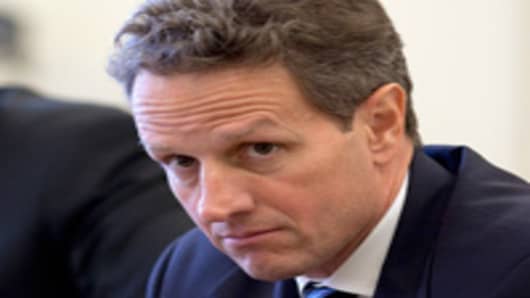Tim Geithner’s warning that the world could face another global financial crisis unless Asia adopts US regulations on derivatives transactions triggered a largely critical response in the region.
Mr Geithner was careful not to name Asian jurisdictions suspected of seeking to avoid tough regulation on derivatives trading, arguing only that Asian “progress” on derivatives trading was essential to prevent regulatory arbitrage.
However, US officials said the Treasury secretary was concerned that Hong Kong and Singapore might try to lure business with softer rules. That went down badly in both Asian financial centers.
The Monetary Authority of Singapore robustly rejected any suggestion that it was weak on regulation, arguing that its banking and derivatives trading rules met or exceeded international norms, and insisting that Singapore had not sought to lure financial business away from other centers through regulatory arbitrage.
The Hong Kong Monetary Authority said it endorsed the view that international harmonization and co-operation were important for global financial stability, but argued that banking supervision in the Chinese territory was already more stringent than international standards.
The dispute reflects differences in the global approach to derivatives trading since the G20 group of large advanced economies agreed in the wake of the crisis that standardized over the counter derivatives trading should move on to exchanges and pass through central clearing by the end of 2012 to reduce systemic risk.
While only a fraction of the notional $600,000 billion of outstanding OTC contracts represents business done in Asia, regional financial centers have made clear that they see the sector as a legitimate area for expansion.
The Singapore Exchange moved quickly to set up both trading and clearing facilities for derivatives contracts, and Hong Kong Exchanges and Clearing, the parent body of the Hong Kong Stock Exchange, has made clear that it plans to go down the same route.
In itself, this ought to be uncontroversial, since the Asian exchanges are operating in line with the G20 agreement, even though neither is a member. But the problem lies in differences on how to deal with the remaining transactions, which are unsuitable for trading on exchanges or for central clearing.
In the US, the Dodd-Frank legislation adopted after the crisis has imposed a global code of conduct on US banks that will force them to demand collateral from parties to uncleared derivatives contracts – wherever the business is done.
There are no such proposals in Asia, so US banks would be at a disadvantage there. As a result, US banks and brokers are angrily warning the Obama administration that they risk losing substantial business.
“We see enormous growth in the [Asia] region and firms are making huge investments to take advantage of that growth; Singapore may well be the winner,” says John Damgard, president of the US Futures Industry Association, which represents banks and brokers in derivatives markets.
One way out of the dispute would be for the G20 to reach a further agreement on derivatives, which Singapore and Hong Kong would abide by.
“Going forward, Hong Kong would continue to adopt, and where appropriate exceed, internationally agreed supervisory standards in order to ensure the continued resilience of our banking sector and that we contribute fully towards global financial stability,” the HKMA said on Tuesday.
MAS also said it would “ensure that its clearing infrastructure will meet any enhanced future international standards”.


